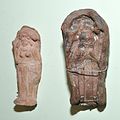Government Museum, Mathura
 Front view of the Museum in Mathura | |
 | |
| Established | 1874 |
|---|---|
| Location | Mathura |
| Key holdings | Mudgarpani Agnipani |
| Founder | Frederic Growse |
| Director | Shiv Prashad Singh |
Government Museum, Mathura, commonly referred to as Mathura museum, is an archaeological museum in Mathura city of Uttar Pradesh state in India. The museum was founded by then collector of the Mathura district, Sir F. S. Growse in 1874. Initially, it was known as Curzon Museum of Archaeology, then Archaeology Museum, Mathura, and finally changed to the Government Museum, Mathura.[1]
Overview
[edit]
The museum houses artifacts pottery, sculptures, paintings, and coins primarily from in and around Mathura, plus discoveries made by noted colonial archaeologists like Alexander Cunningham, F. S. Growse, and Fuhrer.[1] The museum is famous for ancient sculptures of the Mathura school dating from 3rd century BC to 12th century AD., during Kushan Empire and Gupta Empire.[2] today it is one of the leading museums of Uttar Pradesh.[3]
The Government of India issued a postage stamp on 9 October 1974 on the centenary of the museum.
Notable collections
[edit]-
Archaic Mother Goddess, Prehistory, 4th Century BCE
-
3000-year-old anthropomorphic copper figure (ACCN 93-51) found at Shahabad, UP
-
Parkham Yaksha, 150 BCE[4]
-
Mudgarpani Yaksha, 100 BCE[5]
-
Jain chaumukha sculpture with Suparshvanatha and Three Other Tirthankaras, 1st century
-
Jain Ashtamangala, 1st century
-
Ayagapata, Jain Tablet, 1st Century
-
Naigamesha Jain god of Childbirth, 1st-3rd century CE.[8]
-
Parshvantha, Kushan Period, 2nd century
-
Statue of Kanishka I (c. 127 – c. 140), Kushan Empire.
-
Standing Buddha, 2nd century CE
-
Head of Buddha. C. 5th Century CE, Chamunda mound, Mathura district
-
Jain colossal head, Gupta period
-
Standing Buddha, 5th century CE
-
Rishabhanatha idol, 6th century
-
Jain chaumukha sculpture, 6th century
-
Parshvanatha, Post Gupta Period, 6th-8th Century CE
-
Goddess Ambika - Medieval Period
-
Four-armed seated Vishnu in meditation. Medieval Period, Pannapur.
-
Anjani with Child Hanuman, Bronze, Pallava Period
-
Naminatha, 12th century
-
Bodhisattva Manjushri statue, 15th-16th Century
-
Buddha with Vajra, Bronze, 18th Century
-
Balarama, 18th Century
-
Baby Krishna with Ball, Bronze, Modern Age
-
Cast and Mould, Prehistory and Terracotta Gallery
-
Statue of Victoria, Empress of India
See also
[edit]References
[edit]- ^ a b "Government Museum, Mathura". Parampara Project, Ministry of Culture, govt. of India. Archived from the original on 23 October 2021. Retrieved 21 February 2014.
- ^ "Priceless artefacts hidden away from tourists' eyes". The Tribune. 18 August 2002.
- ^ "Mathura-A Treasure Trove Of AntiquitieS". IGNCA website. May–June 2001. Archived from the original on 19 October 2009. Retrieved 7 July 2010.
- ^ Dated 150 BCE in Fig. 15-17, general comments p.26-27 in Quintanilla, Sonya Rhie (2007). History of Early Stone Sculpture at Mathura: Ca. 150 BCE - 100 CE. BRILL. ISBN 9789004155374.
- ^ Dated 100 BCE in Fig.88 in Quintanilla, Sonya Rhie (2007). History of Early Stone Sculpture at Mathura: Ca. 150 BCE - 100 CE. BRILL. p. 368, Fig. 88. ISBN 9789004155374.
- ^ Myer, Prudence R. (1986). "Bodhisattvas and Buddhas: Early Buddhist Images from Mathurā". Artibus Asiae. 47 (2): 111–113 Fig. 10. doi:10.2307/3249969. ISSN 0004-3648. JSTOR 3249969.
- ^ Annual report 1909-10. ASI. pp. 63–65.
- ^ "Naigamesa was a popular deity in the Kushana period and we have at least eight figures of this god from Mathura assignable to c. 1st to 3rd century A.D. (GMM., E. 1, 15.909, 15, 1001, 15. 1046, 15. 1115, 34.2402, 34. 2547, SML., J 626, etc)" in Joshi, Nilakanth Purushottam (1986). Mātr̥kās, Mothers in Kuṣāṇa Art. Kanak Publications. p. 41.
Further reading
[edit]- Sharma, R. C. 1976. Mathura Museum and Art. 2nd revised and enlarged edition. Government Museum, Mathura.
- Growse, F. S. 1882. Mathura A District Memoir.
- Kumar, Jitendera. Masterpieces Of Mathura Museum. Sundeep Prakashan. ISBN 81-7574-118-X.



![Parkham Yaksha, 150 BCE[4]](http://upload.wikimedia.org/wikipedia/commons/thumb/1/12/Yaksha_Manibhadra_-_Parkham_Mathura_circa_150_BCE.jpg/66px-Yaksha_Manibhadra_-_Parkham_Mathura_circa_150_BCE.jpg)
![Mudgarpani Yaksha, 100 BCE[5]](http://upload.wikimedia.org/wikipedia/commons/thumb/a/ac/Mudgarpani_Yaksha%2C_Mathura%2C_100_BCE.jpg/66px-Mudgarpani_Yaksha%2C_Mathura%2C_100_BCE.jpg)
![Seated Bodhisattva, 1st century CE[6][7]](http://upload.wikimedia.org/wikipedia/commons/thumb/b/b3/Amohaasi_Bodhisattva%2C_Mathura.jpg/91px-Amohaasi_Bodhisattva%2C_Mathura.jpg)



![Naigamesha Jain god of Childbirth, 1st-3rd century CE.[8]](http://upload.wikimedia.org/wikipedia/commons/thumb/5/50/Goat-headed_God_Naigamesha_Presiding_Deity_of_Childbirth_among_Ancient_Jainas_-_ACCN_15-1115_-_Government_Museum_-_Mathura_2013-02-24_6067.JPG/76px-Goat-headed_God_Naigamesha_Presiding_Deity_of_Childbirth_among_Ancient_Jainas_-_ACCN_15-1115_-_Government_Museum_-_Mathura_2013-02-24_6067.JPG)



















